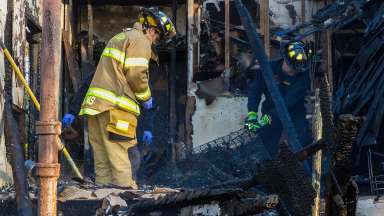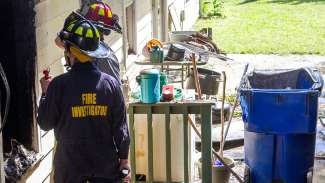When a fire is marked under control and the smoke begins to clear, the job is only beginning for one group of Raleigh Fire Department professionals. The Fire Investigation team is tasked with either assisting with or determining the cause of structural fires and other fires, such as vehicle fires and brush fires. This can be a labor-intensive task, but for team members, it’s like a calling – the fun of putting together a puzzle, the challenge of a mystery.
The Fire Investigation team consists of a handful of North Carolina-certified fire investigators and is based out of Raleigh Fire Station 1. Investigators are automatically dispatched to all confirmed structure fires and are also tasked with investigating several other incidents. Completing the work requires significant amount of prerequisite training as well as at least 40 hours of continuing education training per year.
Science — and Manual Labor
Fire investigation is a science and many of the training aspects focus on learning and practicing the science, explains Capt. James Pearce. “But this work can also be labor-intensive as it generally requires excavation of a fire scene so we can reconstruct events that led to the ignition of a fire,” he says.
Investigators take photographs, conduct witness interviews, and create an accurate sketch of the scene. They then draft (and complete) a final cause and origin report, which pulls all the information together.
Raleigh Fire Department’s investigative team consists primarily of line firefighters, mostly captains and lieutenants. They serve as conventional fire suppression crews daily and put on their investigation hats when the need arises.
“These firefighters get the best of both worlds – they train regularly for fire suppression duties, but also receive training in fire behavior, fire patterns and reconstruction,” Pearce says. “All of this allows them to not only be first-rate firefighters, but to gain additional knowledge that can make them top-notch investigators, too. Often, they find themselves as part of the first response to suppress a fire and then they switch roles and investigate that same scene. While that can be exciting, it can also be physically and mentally challenging.”

